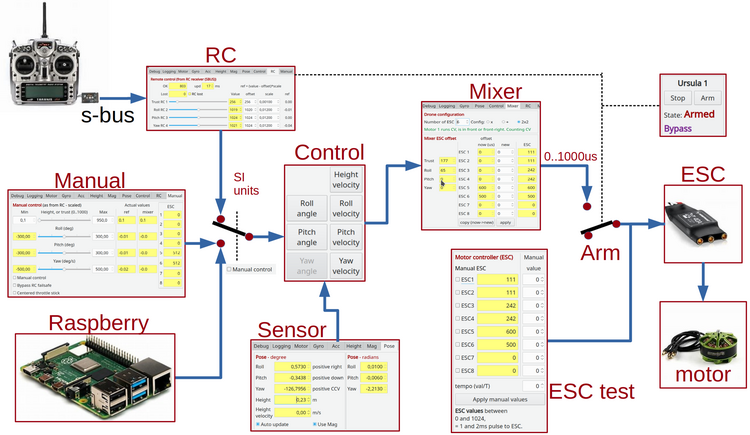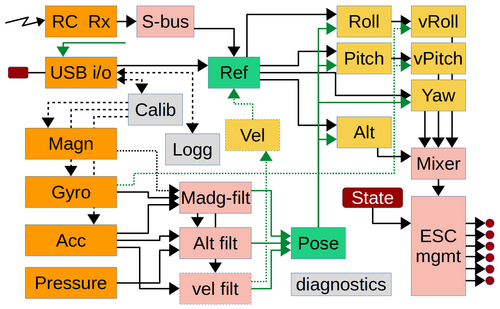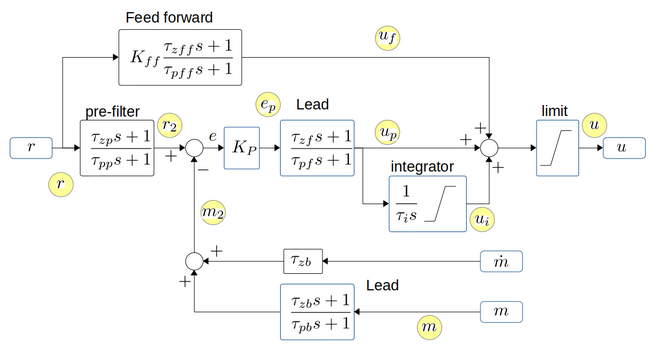Drone firmware
(→Drone firmware) |
(→Functional overview) |
||
| Line 5: | Line 5: | ||
[[File:data-flow-block.png | 750px]] | [[File:data-flow-block.png | 750px]] | ||
| − | Figure. Overall data flow for drone flight | + | Figure. Overall data flow for the drone flight controller. Most blocks also refer to tabs in the GUI (drone_gui). |
[[File:block-functions.png | 500px]] | [[File:block-functions.png | 500px]] | ||
| Line 11: | Line 11: | ||
Figure. The main software functions. Orange blocks are sensor and communication io. Green if the primary measurement and reference (set-point) data (Roll, Pitch, Yaw, Height and possibly lateral velocity. Pink blocks are other software functions. Gray is for configuration and calibration. Yellow blocks are PID control. Diagnosis is mostly battery voltage, but with the capability of measuring temperature and (with internal and external sensor) and current with external sensors. | Figure. The main software functions. Orange blocks are sensor and communication io. Green if the primary measurement and reference (set-point) data (Roll, Pitch, Yaw, Height and possibly lateral velocity. Pink blocks are other software functions. Gray is for configuration and calibration. Yellow blocks are PID control. Diagnosis is mostly battery voltage, but with the capability of measuring temperature and (with internal and external sensor) and current with external sensors. | ||
| − | The pose holds 4 values (roll, pitch, yaw and height). The roll, pitch and yaw | + | The pose holds 4 values (roll, pitch, yaw and height). The roll, pitch and yaw position is estimated by the Madgwick filter. The raw gyro values are used as velocity measurement directly and as the D-term by the angle controllers. |
| − | Calibration of the gyro and accelerometer is built in. Calibration of the magnetometer is using an external tool (saving the calibration result directly in the | + | Calibration of the gyro and accelerometer is built in. Calibration of the magnetometer is using an external tool (saving the calibration result directly in the onboard flash for the Madgwick filter). |
[[File:block-control.png | 650px]] | [[File:block-control.png | 650px]] | ||
Revision as of 16:27, 4 June 2021
Back to Drone control
Contents |
Functional overview
Figure. Overall data flow for the drone flight controller. Most blocks also refer to tabs in the GUI (drone_gui).
Figure. The main software functions. Orange blocks are sensor and communication io. Green if the primary measurement and reference (set-point) data (Roll, Pitch, Yaw, Height and possibly lateral velocity. Pink blocks are other software functions. Gray is for configuration and calibration. Yellow blocks are PID control. Diagnosis is mostly battery voltage, but with the capability of measuring temperature and (with internal and external sensor) and current with external sensors.
The pose holds 4 values (roll, pitch, yaw and height). The roll, pitch and yaw position is estimated by the Madgwick filter. The raw gyro values are used as velocity measurement directly and as the D-term by the angle controllers.
Calibration of the gyro and accelerometer is built in. Calibration of the magnetometer is using an external tool (saving the calibration result directly in the onboard flash for the Madgwick filter).
Figure. The PID control blocks all have these functionalities. The yellow circles indicate logging interfaces.
Drone control firmware
There are two versions of the drone firmware, one for the motor test (mostly performance of a single motor) without the need of the prop-sheld and a full version to be used on the flying drone.
To get the source code - see section "software and files" below.
Arduino version
Arduino version 1.8.13 (specifically the interrupt based ADC library for Teensy) requires at least GCC version 10 to compile.
But changing a few 'constexpr' to 'inline' makes it compile on GCC version 9.3 and work - maybe with a slightly larger code.
Drone control firmware
The firmware is in the "drone_ctrl" directory.
To compile the source for a Teensy 3.5 or 3.6 the Teensiduino needs to be installed first.
Install Teensiduino, see https://www.pjrc.com/teensy/td_download.html . Start with installing the most recent supported version of Arduino, then overlay this by installing the Teensiduino.
Once installed the directory needs to be prepared for compilation.
Linux
make shortcut links to libraries and compiler. The shourtcut described below assumes you have installed arduino version 1.8.9 (and Teensiduino) in your home directory, change as appropriate:
cd drone_ctrl/motortest ln -s ~/arduino-1.8.9/hardware/teensy/avr/libraries ln -s ~/arduino-1.8.9/hardware/teensy/avr/cores/teensy3 ln -s ~/arduino-1.8.9/hardware/tools/ make make upload
Drone firmware
The drone flight controller firmware is in the "drone_ctrl" directory.
To compile the source for a Teensy 3.5 or 3.6 the Teensiduino needs to be installed first.
Install Teensiduino, see https://www.pjrc.com/teensy/td_download.html . Start with installing the most recent supported version of Arduino, then overlay this by installing the Teensiduino.
Once installed the directory needs to be prepared for compilation.
Linux
make shortcut links to libraries and compiler. The shourtcut described below assumes you have installed arduino version 1.8.9 (and Teensiduino) in your home directory, change as appropriate:
cd drone_ctrl/drone_ctrl ln -s ~/arduino-1.8.9/hardware/teensy/avr/libraries ln -s ~/arduino-1.8.9/hardware/teensy/avr/cores/teensy3 ln -s ~/arduino-1.8.9/hardware/tools/ make make upload


